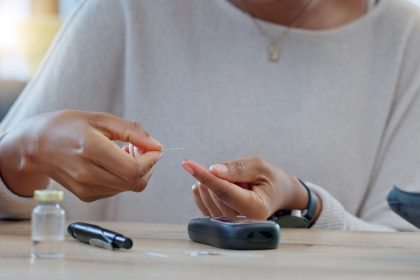For some individuals with diabetes, particularly Type 2, lifestyle modifications offer an alternative to prescription medications. While medical guidance varies based on individual circumstances, consistent daily habits can play a significant role in regulating blood glucose levels.
These non-pharmaceutical approaches require commitment and personal responsibility but can produce meaningful improvements in metabolic health for certain patients.
Nutritional strategies
Diet becomes the primary intervention for those managing diabetes without medication. Food choices directly impact blood glucose levels, with each meal either stabilizing or elevating sugar levels.
Whole foods focus: Many who maintain drug-free management prioritize unprocessed foods including:
- Leafy green vegetables rich in micronutrients
- Legumes that provide protein and complex carbohydrates
- Nuts and seeds containing healthy fats and fiber
- Low-glycemic fruits, particularly berries
- Whole grains in appropriate portions
Fiber emphasis: Foods high in dietary fiber slow sugar absorption into the bloodstream, moderating post-meal glucose spikes.
Healthy fat inclusion: Sources like avocados, olive oil and nuts help create meals that support satiety without rapid blood sugar fluctuations.
The most successful nutritional approaches typically involve eliminating ultra-processed foods, refined sugars and sweetened beverages, which can deliver almost immediate improvements in glucose readings.
Physical activity benefits
Regular movement plays a crucial role for those pursuing drug-free diabetes management. Exercise affects blood glucose through multiple mechanisms:
Improved insulin sensitivity: Regular activity helps cells respond more effectively to available insulin.
Direct glucose uptake: Working muscles can absorb glucose from the bloodstream even without insulin assistance, providing an immediate lowering effect.
Long-term metabolic improvements: Consistent exercise helps reduce overall insulin resistance while improving cardiovascular health.
The specific form of movement matters less than its regularity. Walking, swimming, cycling or dancing all offer benefits when performed consistently, with even modest activity providing measurable improvements.
Sleep and stress management
Often overlooked aspects of blood sugar regulation include sleep quality and stress levels:
Sleep impact: Poor sleep increases cortisol production, which can elevate blood glucose and worsen insulin resistance.
Stress effects: Chronic stress triggers hormonal cascades that raise blood sugar levels through the body’s fight-or-flight response.
Those successfully managing diabetes without medication often incorporate specific practices to address these factors:
- Establishing consistent sleep schedules
- Creating calming bedtime routines
- Practicing regular mindfulness techniques
- Engaging in stress-reduction activities like deep breathing or yoga
- Prioritizing seven to eight hours of quality sleep nightly
These lifestyle elements require self-awareness and consistency but significantly influence overall glucose stability.
Monitoring approaches
Even without medication, tracking blood glucose remains essential for effective management. Regular monitoring provides data that helps individuals understand how specific foods, activities, stress levels and sleep patterns affect their unique metabolism.
Some use continuous glucose monitors for real-time feedback, while others rely on traditional finger-prick testing. This information allows for personalized adjustments to daily habits and helps identify concerning patterns before they become problematic.
This data-driven approach transforms management from reactive to proactive, empowering individuals to make informed decisions about their daily choices.
Support systems
Managing diabetes without medication doesn’t mean doing it without support. Many find success through:
Professional guidance: Working with dietitians, certified diabetes educators or health coaches who specialize in non-pharmaceutical approaches.
Community connection: Joining support groups or online communities where experiences and strategies can be shared.
Accountability partnerships: Establishing relationships that provide encouragement during challenging periods.
These connections help address the emotional aspects of chronic condition management while providing practical knowledge from others on similar journeys.
Recognizing limitations
Drug-free diabetes management isn’t appropriate or possible for everyone. The approach works best when:
- The individual remains under medical supervision
- Regular laboratory testing confirms stable markers
- No complications are present that require medication
- The person maintains strong commitment to lifestyle changes
- Medical providers support the approach based on individual circumstances
For many people with diabetes, medication remains essential for preventing serious complications. The decision to manage without pharmaceuticals should always involve healthcare provider guidance and regular monitoring.
Individual success factors
Those who successfully control blood sugar without medication often share common characteristics:
- Consistent daily routines around eating and activity
- Regular monitoring and record-keeping
- Willingness to adjust strategies based on results
- Strong self-motivation and discipline
- Realistic expectations about the effort required
- Proactive communication with healthcare providers
These factors contribute to sustainable approaches that can maintain glucose control over time rather than providing temporary improvements.
The potential to manage diabetes through lifestyle measures highlights the body’s capacity for adaptation and improvement when given appropriate support. While not universal, these non-pharmaceutical approaches provide viable options for some individuals while reinforcing the importance of daily habits in managing chronic health conditions.
















